Which MBA Specialization Is the Best Paid: MBA Specializations 101
As a career-driven professional, you may be contemplating pursuing a Master of Business Administration (MBA) to propel your career to new heights. But with several specializations to choose from, you might be asking yourself, "Which MBA specialization is best paid?" This article aims to provide comprehensive insights into the highest paying MBA specializations, how to choose the right one, and an overview of the top 10 specializations you might consider.
Highest Paying MBA Specializations
When it comes to earning potential, certain MBA specializations tend to offer higher salaries than others. Here are some of the highest paying MBA specializations with salary estimates from collegescorecard:
1. Finance
Similar to accounting a Finance MBA can land you a job in investment banking, corporate finance, and private equity. The highest paying median salary for a Finance MBA comes from The University of Pennsylvania with a median earnings of $302,526.
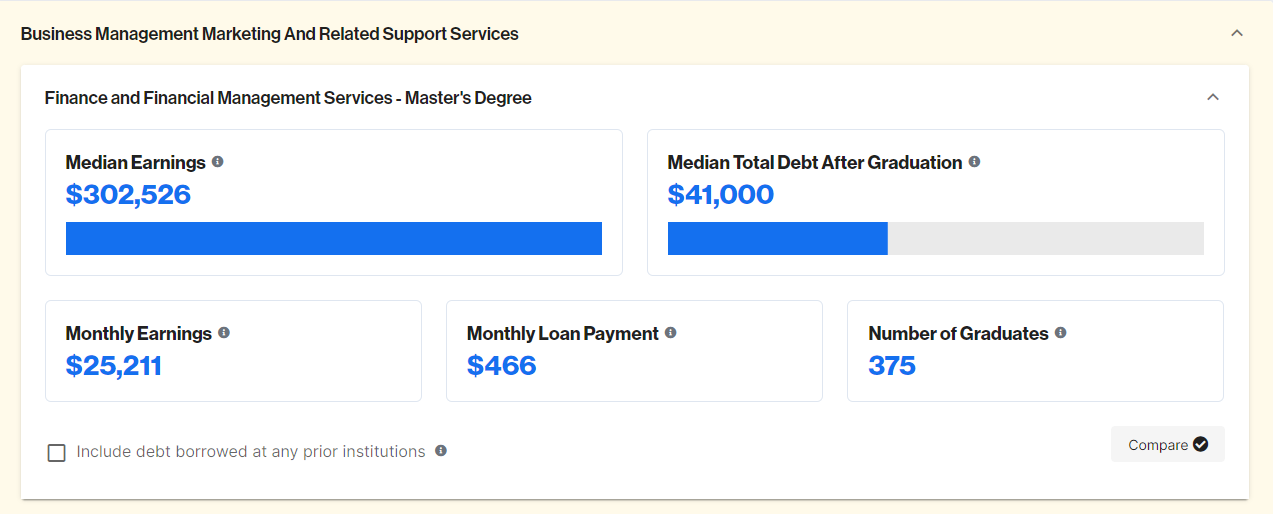
2. Consulting
Management consulting is known for offering lucrative salaries to MBA graduates due to the high demand for strategic and operational advice across various industries. The highest paying median salary for a consulting MBA comes from Stanford University with a median earnings of $242,791.
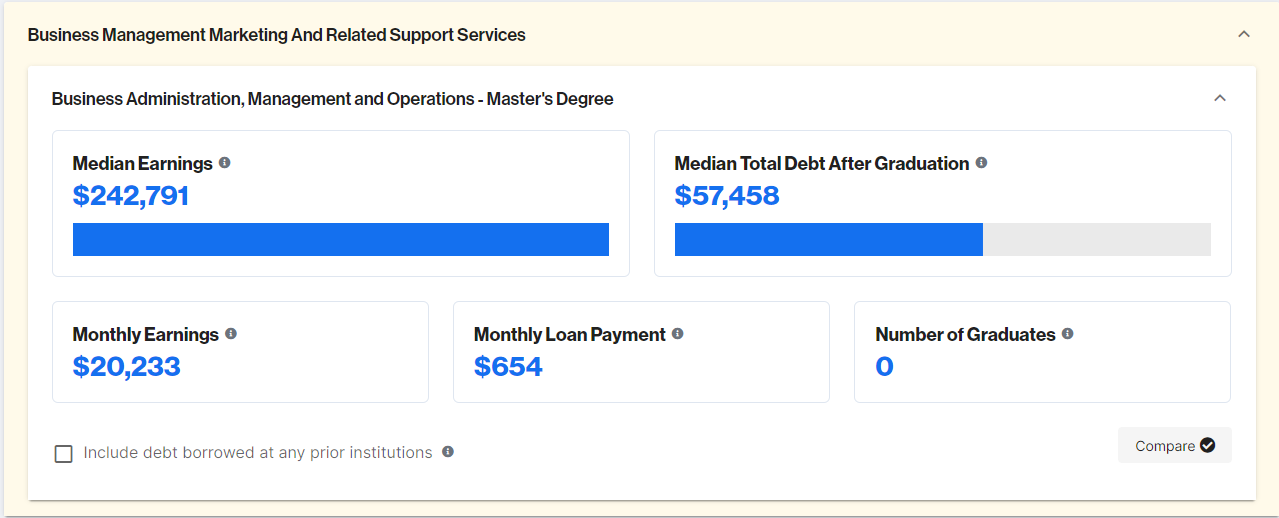
3. Technology Management
With the increasing influence of technology in business, MBA graduates with a focus on technology management can secure well-paying roles in tech companies and other organizations. The highest paying median salary for a Technology MBA comes from The University of Pennsylvania with a median earnings of $219,625.
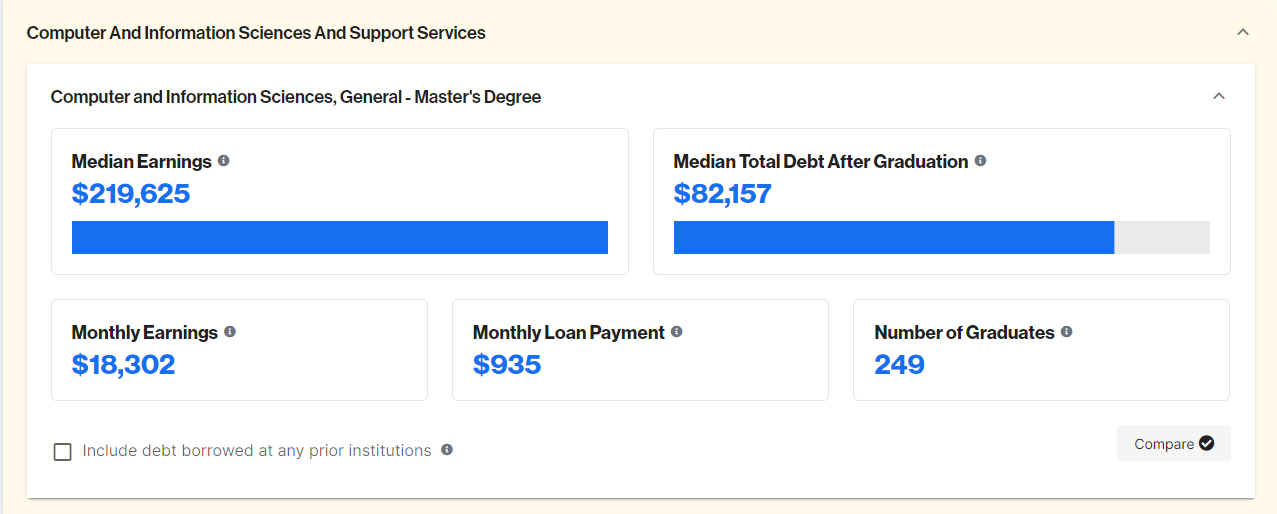
4. Marketing
MBA graduates with a specialization in marketing can pursue high-paying roles in brand management, product marketing, and digital marketing, especially in sectors such as luxury goods and technology.The highest paying median salary for a marketing MBA comes from Marquette University with a median earnings of $210,480.
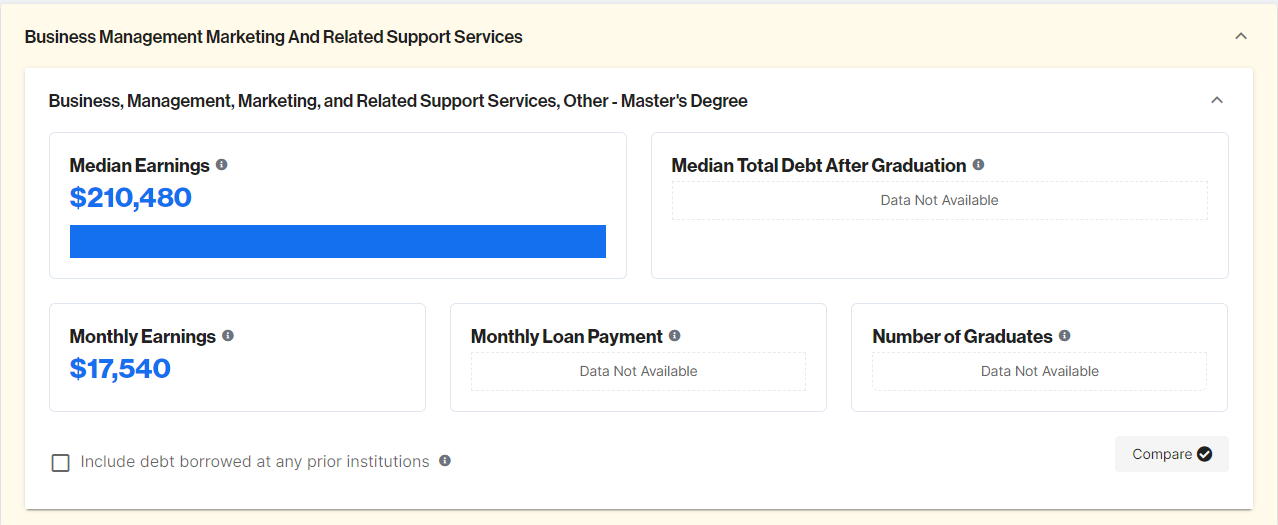
5. Accounting
Specializing in accounting can lead to high-paying positions in investment banking, corporate finance, and private equity. The highest paying median salary for an accounting MBA comes from New York University with a median earnings of $122,129.
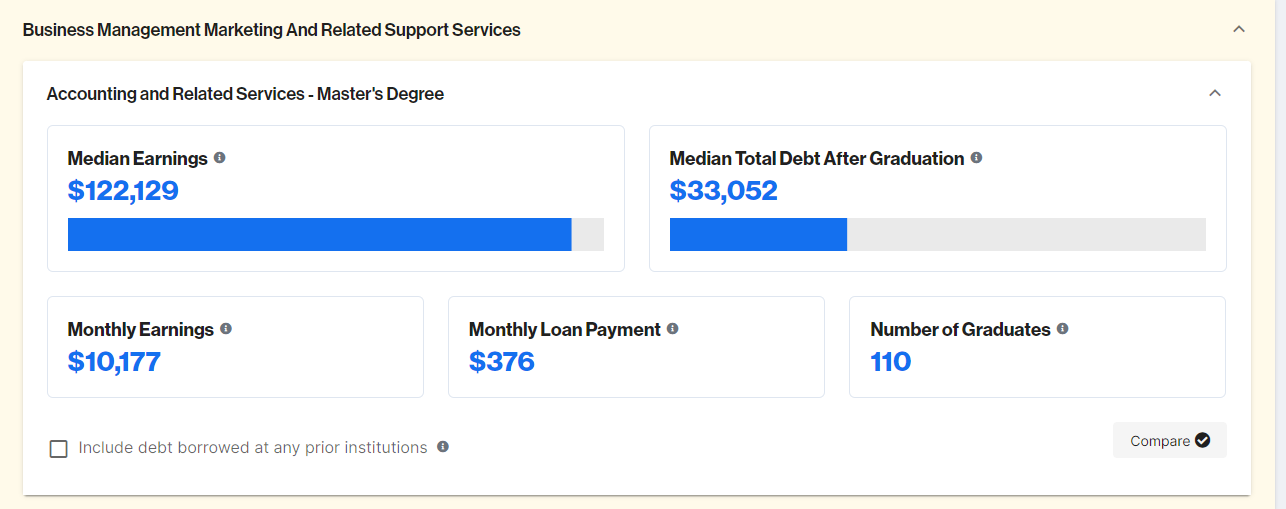
It's important to note that salary potential can also depend on factors such as work experience, the reputation of the MBA program, and the location of employment.
If you are enjoying what you are reading please share this article with someone that would benefit from this information because it is word of mouth referrals like this that help grow Acquired Salary's reach.
What is an MBA?
An MBA, or Master of Business Administration, is a postgraduate degree that equips students with a comprehensive understanding of business and management practices. It typically lasts one or two years and is geared towards students with at least three to five years of prior work experience. The program encompasses various business concepts, including financial management, human resources, project management, and business strategy.
The MBA degree is designed to provide a holistic overview of business, with core modules covering marketing, finance, strategy, and accounting, among other critical management topics. The program is known for fostering effective communication skills, a deep understanding of business strategy, and strong leadership capabilities.
What is an MBA Specialization?
While a general MBA offers a broad overview of business management, an MBA specialization or concentration allows students to delve deeper into a specific subject area. It's a chance for you to supplement your generalist management training by becoming an expert in a chosen field. This could be anything from general management and finance to marketing and entrepreneurship.
An MBA specialization is particularly valuable if you've already identified a specific career path you want to pursue. It provides you with advanced knowledge in a particular area, potentially increasing your chances of landing a suitable role after graduation.
Why Should I Choose an MBA Specialization?
The decision to choose an MBA specialization should be based on your career aspirations. If you're clear about the industry or role you want to work in, a specialized MBA can equip you with the advanced knowledge and skills required for that particular area.
However, if you're unsure about your career path, a generalized MBA could be a better fit. It provides a wide range of knowledge that can be applied across various industries, keeping your career options open.
What is the Difference Between an MBA Specialization and a Major or Concentration?
Though often used interchangeably, the terms 'MBA specialization', 'major', and 'concentration' refer to the same concept — a focused program of study within an MBA degree that provides specific knowledge in a particular area of business. This specialized knowledge prepares you for a specific career area while equipping you with the same general skills as a traditional MBA program.
How to Choose an MBA Specialization?
Choosing an MBA specialization is a crucial decision that can significantly impact your career trajectory. Here are some steps to help you choose the right MBA specialization:
Assess Your Interests and Goals
- Reflect on your strengths, weaknesses, and interests.
- Consider your long-term career goals and how a specific specialization can help you achieve them.
Research Various Specializations
- Explore the different MBA specializations available, such as finance, marketing, operations, human resources, and entrepreneurship.
- Understand the curriculum, career prospects, and industry demand for each specialization.
Evaluate Market Trends
- Analyze current market trends and job opportunities in different industries and sectors.
- Consider the future growth potential of various specializations.
Consider Your Skills and Experience
- Assess your existing skills and professional experience to determine which specialization aligns best with your background.
Seek Guidance
- Connect with professionals and alumni from various MBA specializations to gain insights into their experiences and career paths.
- Speak with academic advisors and career counselors to get expert advice.
Networking and Internships
- Engage in networking events and informational interviews to understand the day-to-day responsibilities of professionals in different specializations.
- Consider pursuing internships in your areas of interest to gain practical exposure.
Flexibility and Adaptability
- Keep an open mind and be willing to adapt to changing industry demands.
- Choose a specialization that aligns with your passions while also offering flexibility for future career shifts.
Final Decision
- After thorough research and self-assessment, make an informed decision that aligns with your career aspirations and personal interests.
Remember, the right MBA specialization can open doors to exciting career opportunities, so take the time to make a well-informed choice.
10 MBA Areas of Specialization to Consider
Here are the top ten MBA specializations that you might consider, each with its unique career prospects and earning potential.
1. Finance
A finance specialization in an MBA program offers in-depth knowledge in asset management, fintech, strategic and financial risks management, and company valuation. It prepares you for high-paying roles like financial manager, investment banker, or chief financial officer, with a base median starting salary of $125,000.
2. Business Intelligence and Data Analytics
This MBA specialization equips you with skills to synthesize current business trends, data visualization, data mining, and risk management systems. It opens doors to roles such as business analyst, big data analyst, and data scientist.
3. Entrepreneurship
An MBA in entrepreneurship helps you develop the skills necessary for successful start-up creation. You'll learn about creating value-driven business models, stakeholder engagement, building successful teams, and more. It prepares you for roles in venture capital or to start your own business.
4. International Business
An international business specialization in an MBA program focuses on global business, including international finance, economics, and cross-cultural management. It prepares you for roles in multinational companies that operate worldwide.
5. Marketing
An MBA in marketing provides you with the knowledge and skills necessary to succeed in marketing roles. You'll learn about consumer behavior, marketing management, marketing analytics, pricing strategy, and brand management.
6. Health Administration
An MBA in health administration provides you with the business skills necessary to manage healthcare organizations. You'll learn about strategic planning in health and social care settings, healthcare policy, health economics, and more.
7. Organizational Leadership
An MBA with a concentration in organizational leadership helps you develop leadership and strategy skills, especially in team settings. It prepares you for roles like training and development manager, organizational development manager, and performance development manager.
8. Human Resources
An MBA in human resources equips you with knowledge about compensation theories, wage and salary administration practices, evaluation systems, performance appraisals, and incentives. It prepares you for positions like human resources manager or senior human resources consultant.
9. e-Business Strategic Management
An e-business strategic management MBA prepares you for today's complex business environment, which incorporates new and evolving technologies. You'll learn about database management, enterprise internetworking, and web-based enabling.
10. Accounting
An MBA in accounting covers financial reporting, data analysis for decision-making, business process, human resources, and marketing management. It prepares you for roles as a certified public accountant, financial analyst, or auditor.
Which MBA Path Is Right for You?
Choosing between a general MBA and a specialized MBA depends on your professional goals and personal interests. If you're clear about your career aspirations and desire to delve deep into a particular field, a specialized MBA might be best. However, if you're still exploring your options and would like a broad overview of business management, a general MBA could be the better choice.
When choosing an MBA specialization, consider the demand for that specialization, potential salary, and how it aligns with your career goals. Always remember that the "best" MBA specialization is the one that fits your professional aspirations and personal interests. Know your aspirations inside and out with a well crafted career development plan. Start creating intentionality in your career and develop a plan. Jumpstart the process by watching Acquired Salary's Free Career Development Masterclass.
Career Mastery Community

How to get a promotion in less than 90 days and learn the 3 pillars to increase your Salary by 30% or more.
Ready to take your career to the next level?
Learn even more about successfully developing your career without going back to school. Click the button to join Acquired Salary's Career Mastery Mastermind!
More Career Tips, Tricks & Tools
Blog




-
What do career coaches do?
Career coaches assess skills and values to align them with suitable career paths. They offer strategic advice on job search activities, including crafting compelling resumes and cover letters. Career coaches can also assist with overcoming workplace challenges and fostering professional development.
-
How do I know if I need a career coach?
If you find yourself feeling stuck, unfulfilled, or uncertain about your career path, a career coach can provide valuable insights and strategies to help you make informed decisions. Whether you're considering a career change, seeking professional growth, or looking to improve your job search techniques, a career coach can be a valuable partner in your journey to success.
-
How long does career coaching take?
The duration of career coaching varies depending on your unique circumstances and objectives. Some clients find value in a few focused sessions, while others choose ongoing support over an extended period. Your career coach will work with you to determine the most suitable timeframe and frequency of sessions to ensure maximum benefit.
-
Why Salary is better than hourly?
There are benefits to both salary and hourly. The benefits of having a salary is the security of steady paychecks and on average salary employees tend to have a higher income than hourly employees.
-
Why is salary Important
When you have employees who are getting paid salary they are usually more productive if they are paid right. That is why salary negotiations are much more important. A salary increase plays a crucial role in productivity.
-
How to negotiate salary?
When negotiating salary there are mutliple ways you can be productive. These can include: becoming familiar with your industry, staying positive, practice, and more.
Subscribe to Our Newsletter
We will get back to you as soon as possible
Please try again later